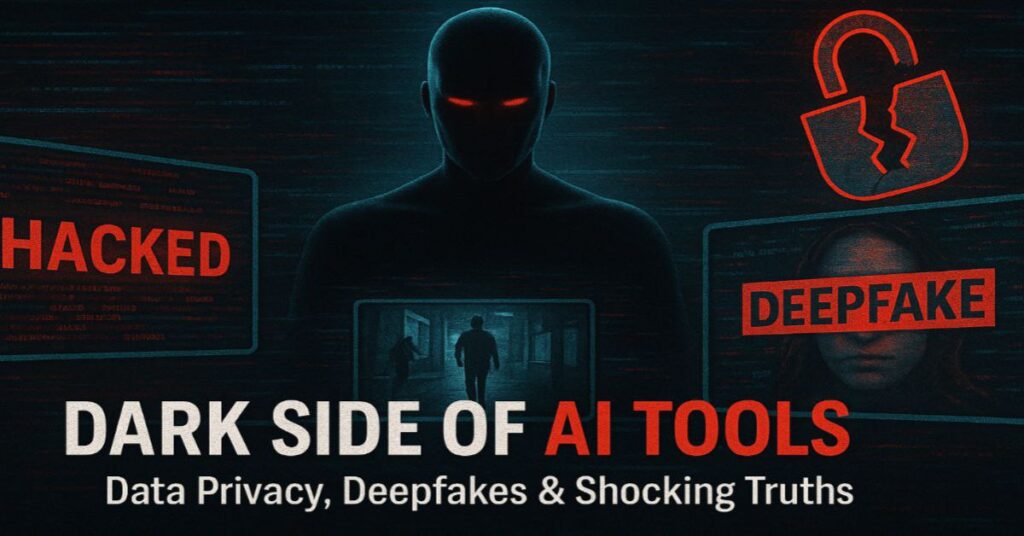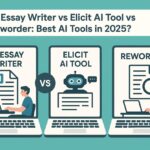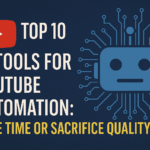
In 2025, AI tools like ChatGPT, Gemini, Notion AI, and Midjourney are more powerful and accessible than ever. They’re helping people write better, design faster, and grow businesses. But with this rapid growth, a darker side of AI is also emerging—one that’s quietly affecting our privacy, online trust, and even democracy.
This article uncovers the less-talked-about risks of AI tools in 2025, and what you, as a creator, freelancer, or small business owner, should know before depending too heavily on them.
Data Privacy: Who Owns Your Prompts, Inputs, and Output?
Many AI platforms store your data, including the prompts you input and the outputs they generate. For instance, when you use ChatGPT or Notion AI, your creative work might be logged and used for future model training—unless you opt out (which many users don’t know how to do).
- Real-world concern: A freelance copywriter once discovered that a portion of his unique article reappeared on another site, seemingly generated by someone else using the same AI model.
- Why it matters: If you’re sharing client data, confidential project details, or original IP via AI tools, it might not stay private.
Tips:
- Always check the AI tool’s privacy policy.
- Use enterprise versions of AI tools like ChatGPT Team or Notion AI Pro, which offer better data handling policies.
➡️ Try safer versions here: ChatGPT Team

Rise of Deepfakes: When AI Images and Videos Mislead the World
AI-powered image and video tools like Midjourney, Runway, and Synthesia are now capable of generating ultra-realistic visuals. While they’re amazing for marketing and content creation, they’re also being used for fake news, scams, and political manipulation.
- Example: A deepfake video of a celebrity endorsing a fake product went viral on TikTok before it was flagged.
- Risk: Audiences can’t always distinguish AI-generated content from real footage. This creates trust issues.
Pros: Useful for content creators and educators
Cons: Easily misused for fraud, impersonation, and misinformation
Tools to use cautiously: Midjourney, Runway, Pika Labs, D-ID
The Productivity Trap: When Over-Reliance on AI Kills Your Creativity
While AI is great for automating repetitive tasks, many users in 2025 are falling into a creativity trap. Relying entirely on tools like Gemini, Copy.ai, or Jasper can make content feel templated and soulless.
- Use-case gone wrong: A solopreneur used AI to run his entire blog for 6 months. He gained traffic but lost engagement and return users because the content lacked personal stories or a unique voice.
Tips to stay human:
- Use AI for structure and ideation, but add your own voice.
- Add examples from your experience to make content relatable.
➡️ Best AI tool for writing with personality: Jasper AI
Manipulation of SEO and Algorithms – When AI Gaming Backfires
AI-powered SEO tools like Surfer SEO, NeuronWriter, and Frase are helping creators rank faster. But some users misuse them to stuff keywords or create low-value content that temporarily tricks Google.
- What happens next: Google’s algorithm updates catch such patterns and penalize your domain, leading to long-term traffic drops.
Pros: Great for keyword suggestions and SERP analysis
Cons: Misuse can hurt reputation and rankings
Tools to use ethically: Surfer SEO, NeuronWriter, Frase
➡️ Try the best AI-powered SEO tools here: Surfer SEO
Job Displacement and Ethical Concerns: The Unspoken Reality
AI is replacing routine jobs in writing, designing, customer service, and even teaching. While this brings efficiency, it also fuels job insecurity for freelancers and workers.
- Real scenario: A small business in Mumbai replaced 3 content writers with 1 person using Notion AI and ChatGPT.
Pros: Cost-efficient and scalable
Cons: Emotional toll, unemployment, loss of human touch
Suggestion: Use AI as a collaborator, not a replacement. Upskill in areas AI can’t replicate—strategy, empathy, storytelling.

Practical Tips to Use AI Tools Safely in 2025
- Always read the privacy policy of any AI tool.
- Opt-out of data collection wherever possible.
- Avoid uploading sensitive client info.
- Check outputs manually before publishing.
- Use human creativity to refine AI content.
FAQs – The Dark Side of AI Tools
Q1. Are free AI tools more dangerous than paid ones?
Often, yes. Free tools may collect data aggressively or have poor content monitoring. Paid versions usually offer better privacy.
Q2. How can I verify if content is AI-generated?
Use AI detection tools like Originality.AI or GPTZero. However, detection isn’t 100% reliable yet.
Q3. Is using AI for client work legally safe?
It depends on the tool’s license and data policy. Always disclose usage and ensure data protection.
Conclusion: Use AI With Eyes Open
AI tools in 2025 are brilliant—but not blind to consequences. As content creators, business owners, or casual users, it’s our responsibility to understand both sides of the AI revolution. When used wisely, AI can accelerate our success. When misused, it can backfire dramatically.
🚀 Start smart, stay ethical.
For more AI insights, risks, and solutions—subscribe to IntelliVistaAI today.
Read More about AI tools:-
Future of Artificial Intelligence in India: 5 Game-Changing Use Cases You’re Missing
12 Powerful AI Tools That Will Skyrocket Your Productivity in 2025
How to Integrate AI Code Assistants into Your Development Workflow (Step-by-Step Guide)
Hi, I’m Santu Kanwasi, a passionate blogger with over 2 years of experience in content writing and blogging. I create original, informative, and engaging articles on a wide range of topics including news, trending updates, and more. Writing is not just my profession—it’s my passion. I personally research and write every article to ensure authenticity and value for my readers.
Whether you’re looking for fresh perspectives or reliable updates, my blog is your go-to source!





